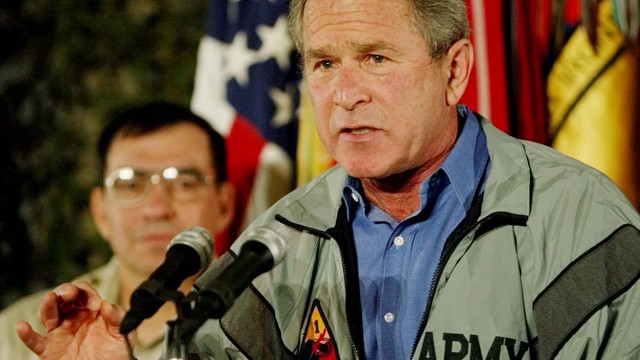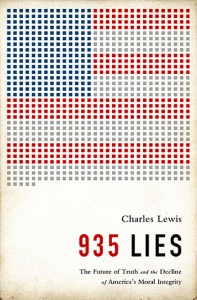
The following is an excerpt from Charles Lewis’s book, 935 Lies. Lewis joins Bill this week to talk about why facts, logic and reason are often missing in the rush to war.
At the end of 2004, a series of public opinion polls offered disturbing news. More than half of all Americans, we learned, believed that there had been weapons of mass destruction (WMDs) in Iraq — the principal raison d’être for George W. Bush’s war of choice there — despite the fact that numerous widely publicized bipartisan and international reports had definitively shown that no such weapons existed. This stubborn refusal to face the facts about Iraq continues today for millions of Americans. [1]

Publisher: PublicAffairs Books, 392 pages
Facts are and must be the coin of the realm in a democracy, for government “of the people, by the people, and for the people,” in Abraham Lincoln’s words, requires an informed citizenry. [2] But in regard to the Iraq War, it seems, facts are now irrelevant or at least debatable, a mere matter of opinion, for a majority of Americans. And if facts no longer matter to millions of our fellow citizens, then what becomes of the traditional role of the journalist as the independent watchdog digging through obfuscation, secrecy and deception by the powerful in search of what Carl Bernstein once called “the best obtainable version of the truth”?
This is a question that touches me personally — not just as a concerned citizen, but as someone who has dedicated his life and work to the pursuit of truth. In more than three decades as an investigative reporter in Washington, DC, my approach toward those in power, regardless of party or ideology, has followed the principle “Watch what they do, not what they say.”
Politicians, captains of industry, and their zealous aides too often resemble circus barkers, shilling for attention and advantage, with little regard for accuracy or veracity, using the press and the news media not to enlighten but to bamboozle the public in pursuit of votes, profits and power. When necessary, they even employ the wiles of deception to conceal, disguise, or justify unseemly and sometimes outright criminal behavior. As George Orwell wrote, in words that still ring true more than half a century after they were written, “Political speech and writing are largely the defence [sic] of the indefensible . . . Political language . . . is designed to make lies sound truthful and murder respectable, and to give an appearance of solidity to pure wind.”[3]
So as a professional truth-seeker, I have always been skeptical of statements by those in power, preferring to ignore the official versions of events in my quest for the (sometimes ugly) underlying realities. That quest continues. But when I learned the extent to which the public had swallowed and accepted the official lies about WMDs in Iraq, I realized that I actually could no longer ignore what those in power had said. Their shameless manipulations and mis-representations, I now saw, were a crucial element in the tragedy of that dubious war of choice, and therefore deserving of investigation and analysis in their own right. Precisely what had US government officials said to cause most Americans and their elected representatives to completely ignore facts, logic, and reason in the rush to war? Exactly who was involved and to what extent?
I began systematically to investigate the answers to those and other related questions, enlisting the help of a team of reporters, researchers and other contributors that ultimately included 25 people. Nearly three years later, the Center for Public Integrity published Iraq: The War Card, a 380,000-word report with an online searchable database. [4] It was released on the eve of the five-year anniversary of the invasion of Iraq and was covered extensively by the national and international news media.
Our report found that in the two years after the terrorist attacks of September 11, 2001, President George W. Bush and seven of his administration’s top officials made at least 935 false statements about the national security threat posed by Iraq. The carefully orchestrated campaign of untruths about Iraq’s alleged threat to US national security from its WMDs or links to al Qaeda (also specious) galvanized public opinion and led the nation to war under decidedly false pretenses. Perhaps most revealing: the number of false statements made by top Bush administration officials dramatically increased from August 2002 to the time of the critical October 2002 congressional approval of the war resolution and spiked even higher between January and March 2003, between Secretary of State Colin Powell’s address before the United Nations General Assembly and the fateful March 19, 2003, invasion. [5]
Within hours of the release of our report, White House press secretary Dana Perino responded with scorn: “I hardly think that the study is worth spending any time on. It is so flawed in terms of taking anything into context or including — they only looked at members of the administration rather than looking at members of Congress or people around the world. Because as you’ll remember, we were part of a broad coalition of countries that deposed a dictator based on a collective understanding of the intelligence.” [6] This sophistry was at least consistent with the administration’s track record of distorting reality. In fact, neither Congress nor America’s international allies was demanding an invasion of Iraq before the administration started beating the war drums.
The so-called Coalition of the Willing was a face-saving artifice cobbled together after the UN Security Council failed to approve the US-instigated invasion, rendering it a violation of the UN Charter and thus “illegal.” Furthermore, “the intelligence” referred to by Perino proved to be anything but intelligent; indeed, it had been mostly manufactured by the administration in accordance with its political agenda. [7]
Three months after the Center for Public Integrity Iraq report, David Barstow of The New York Times reported more details about how the Iraq deception had been orchestrated. Barstow revealed that the Pentagon had quietly recruited and coached 75 retired military officers to be “independent” paid consultants and radio and television analysts whose true role was to make the case for war in Iraq. Many had significant, undisclosed financial ties to defense companies and were thus benefiting hugely from the very policies they were “analyzing.” [8]
Earlier, Barstow had reported (with colleague Robin Stein) that “at least 20 federal agencies, including the Defense Department and the Census Bureau, have made and distributed hundreds of television news segments between 2001 and 2005 . . . Many were subsequently broadcast on local stations across the country without any acknowledgement of the government’s role in their production.” David Walker, the then comptroller general of the Government Accountability Office, who happened to be a Republican, declared that such taxpayer-paid propaganda by the government is unethical and violates federal law. However, the Bush administration publicly disagreed, and Congress meekly declined to pursue the matter any further. [9]
The broadcast and cable news media, which had overwhelmingly failed to investigate or challenge the administration’s flawed case for war, shamelessly ignored Barstow’s revelations, neither reporting on their own dubious use of such compromised news sources nor apologizing to the public for the resulting gross misrepresentations of fact.
And a month after the stunning Times stories, one of the White House officials who had actually made several false statements in the lead-up to the Iraq invasion, former press secretary Scott McClellan, wrote a “surprisingly scathing” memoir admitting that his own public comments at White House briefings about Iraq had been “badly misguided,” that President Bush had not been “open and forthright on Iraq,” and that instead he had relied on “propaganda.” [10]
There were a few honorable exceptions in Washington to the general failure of the news media to challenge the pro-war deceptions. They included the fine independent coverage by then Knight Ridder (now McClatchy) Washington bureau reporters Warren Strobel and Jonathan Landay; the prescient articles by Walter Pincus, buried in the back pages by his nervous Washington Post editors; and, in early 2004, the Abu Ghraib prison-abuse scandal stories by CBS News 60 Minutes II and Seymour Hersh in the New Yorker. Later, in 2005, beyond the Iraq deceptions, there were Dana Priest’s exposés in The Washington Post about the Central Intelligence Agency’s secret “black site” prisons and James Risen and Eric Lichtblau’s stories in The New York Times revealing how the Bush administration had quietly authorized the National Security Agency (NSA) to secretly eavesdrop on Americans and others inside the United States, without warrants usually required for domestic surveillance. [11]
Could the Iraq War have been prevented if the public had been better informed before the invasion about the specious official statements, faulty logic, and breathtaking manipulations of public opinion and governmental decision-making processes? I believe the answer to that grim question is very possibly yes, and it will haunt me and others in my profession for years to come. [13]
Did President Bush and other officials from his administration lie about Iraq intentionally and deliberately? It’s hard to tell without unfettered access to the principals and their internal communications. Certainly, we should never underestimate the human capacity for self-delusion — too often, we find it easy to believe what we want to believe. But the fact is that they have avoided the glare of formal scrutiny about their personal responsibility for the litany of repeated, false statements in the run-up to war. Under the Republicans in 2005 and 2006, and the Democrats in 2007 and 2008, there was no congressional investigation into this specific question. Congressional oversight focused almost entirely on the quality of the US government’s pre-war intelligence — not the veracity of the highest-ranking US officials’ public statements or the objectivity and logic of their decision making in instigating the war. Nor in 2009 did the new Democratic president Barack Obama, his administration, or the Democratic Congress evince any interest in investigating this politically sensitive subject. There may be no more telling example of what has happened to congressional oversight in Washington in recent decades.
Investigating this tale of dishonesty by those in power and acquiescence on the part of those charged with reporting the truth has been a disheartening experience for me. Even more sobering, however, is the fact that the Iraq War deception, with its 935 public, shameless lies, is simply the latest and most egregious story of truth betrayed that I’ve witnessed or reported on over the past five decades. My career in journalism has coincided with a tragic period in American history — one in which falsehood has increasingly come to dominate our public discourse, and in which the bedrock values of honesty, transparency, accountability and integrity we once took for granted have been steadily eroded.
Excerpted from 935 Lies by Charles Lewis. Copyright © 2014 by Charles Lewis. Excerpted by permission of PublicAffairs, an imprint of the Perseus Books Group. All rights reserved. No part of this excerpt may be reproduced or reprinted without permission in writing from the publisher.


